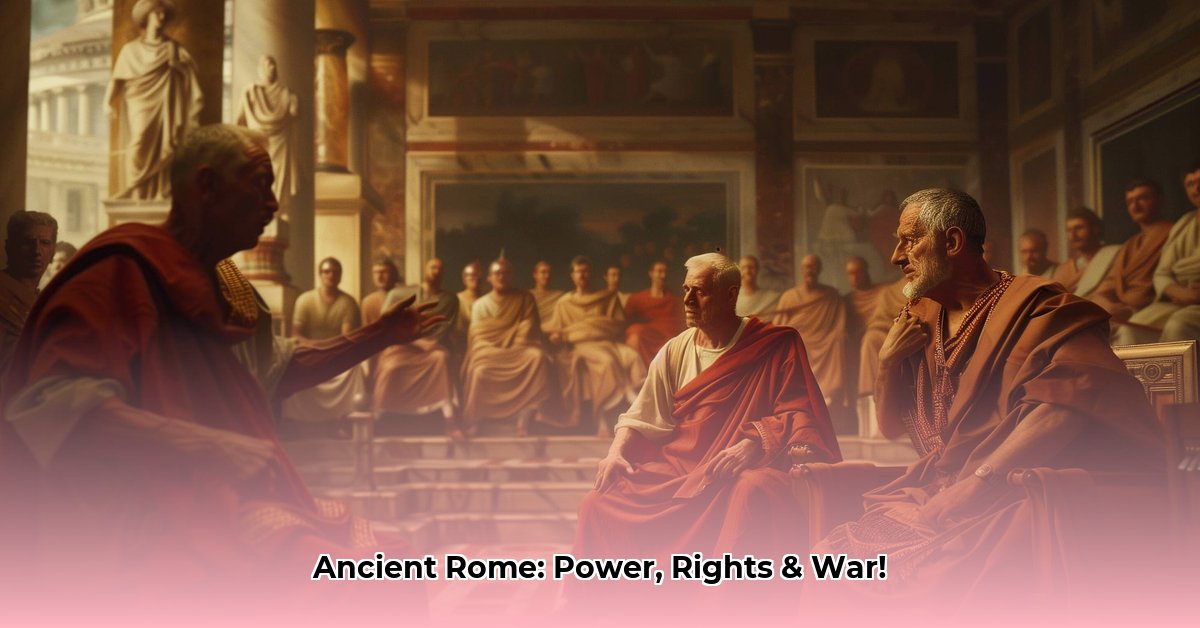What did it truly mean to be a Roman citizen in the ancient world? Far from a mere title, it was a dynamic, evolving status, granting access to a profound array of legal protections, social privileges, and economic opportunities. Initially, Roman citizenship was an exclusive hallmark, primarily for those born within the city’s walls. Yet, over centuries, its very nature transformed dramatically. What began as a local distinction progressively evolved into a sophisticated instrument for the Roman elite, strategically employed to foster loyalty, integrate diverse populations, and maintain control across their vast, burgeoning empire. This journey encompasses pivotal shifts, from military service acting as a direct path to civic inclusion, to the monumental Edict of Caracalla, which fundamentally reshaped the very fabric of Roman society. It’s a compelling narrative of how Rome strived to forge a shared identity among disparate peoples, despite facing numerous challenges and internal conflicts. Intriguingly, this ancient Roman approach to citizenship continues to inform and influence modern discussions about belonging, integration, and the intricate balance between individual rights and collective responsibilities.
The Foundation of Roman Citizenship: Exclusive Beginnings and Legal Pillars
In its earliest forms, Roman citizenship (civitas Romana) was a fiercely guarded privilege, primarily reserved for freeborn males whose parents were both Roman citizens. This status was never passive; it endowed individuals with significant advantages and responsibilities, forming the bedrock of the nascent Republic.
Early Exclusivity and the Twelve Tables
During the early Republic, a sharp divide existed between the aristocratic patricians, who initially monopolized political and religious offices, and the plebeians, the common citizens. Over centuries, the plebeians fought tirelessly for equal rights, culminating in the “Conflict of Orders.” A crucial victory in this struggle was the codification of Roman law in the Twelve Tables around 450 BCE. Displayed publicly in the Roman Forum, these foundational pronouncements provided a transparent, written framework for legal processes, property rights, inheritance, and public behavior. They were a vital step towards ensuring that all citizens, regardless of class, lived under the “rule of law,” preventing arbitrary decisions by patrician magistrates.
Central to the Roman state’s administration was the census, conducted every five years. This meticulous process recorded not only citizens and their households but also their property and wealth. The census served as the basis for military enlistment, taxation, and the organization of citizens into voting units (centuries and tribes), directly influencing their political weight and social standing.
Core Rights and Civic Duties
For full Roman citizens (cives Romani), particularly males, the privileges were extensive:
- Ius Suffragii: The fundamental right to vote in Roman assemblies, allowing direct participation in law-making and elections.
- Ius Honorum: The right to hold public office, enabling them to ascend the political ladder and wield significant influence within the Roman state.
- Ius Commercii: The right to enter into legal contracts and own property, facilitating economic activity and providing security for assets.
- Ius Conubii: The right to contract a lawful Roman marriage, ensuring children born from such unions would automatically inherit Roman citizenship.
- Ius Provocationis: The crucial right to appeal the decision of a magistrate to the people’s assembly, offering a vital safeguard against arbitrary authority, especially concerning capital punishment.
- Ius Vitae Necisque: The “right of life and death” held by the pater familias (male head of a family) over his household, though this was largely symbolic and rarely exercised in its extreme form during historical times, often reserved for decisions regarding newborn children.
These rights came with significant duties, known as munera publica, which included military service, paying taxes, and contributing to public works. Failure to perform these munera could result in the loss of privileges, as seen when men refusing military service during the Second Punic War lost their voting rights.
Acquiring and Evolving Citizenship: Paths and Progressive Expansion
As Rome expanded from a city-state to a vast empire, the means of acquiring citizenship evolved from birthright to a strategic tool for integration.
Beyond Birth: Diverse Pathways to Roman Status
While birth to two Roman citizens remained the primary route, Rome developed additional pathways to citizenship, effectively expanding its citizen base:
- Military Service: One of the most impactful routes, particularly for non-Romans. Serving honorably in the auxilia (non-citizen auxiliary forces) for typically 25 years often resulted in the grant of civitas Romana for the veteran and his descendants upon discharge, systematically integrating vast numbers of people into the Roman system and bolstering the empire’s manpower. Citizens served in the legions, symbolizing their ultimate dedication to Rome.
- Latin Rights (Ius Latii): Inhabitants of some allied communities, particularly in Latium, enjoyed a special status that granted them many ius commercii and ius migrationis (the right to relocate to Rome and potentially gain full citizenship there), but not initially ius conubii or full voting rights. This provided a stepping stone towards greater integration.
- Individual Grants: Roman generals and later emperors could bestow citizenship upon individuals or entire communities for exceptional loyalty, service, or political expediency. This selective granting was a powerful incentive for local elites in conquered territories to align with Roman interests.
- Manumission: Freed slaves (liberti) did not automatically become full citizens but gained a limited form of citizenship, often with restrictions like inability to hold executive magistracies. However, their children were born as free citizens, allowing for social mobility across generations.
The Spectrum of Roman Citizens: Classes and Nuanced Privileges
Roman citizenship was not a monolithic status; it constituted a complex hierarchy of legal standings, each with distinct rights and limitations.
Graded Statuses within the Roman Sphere
- Cives Romani: Full Roman citizens, enjoying all legal protections and rights. These were further divided into optimo iure (with full rights, including voting and office-holding) and non optimo iure (with property and marriage rights but not always political ones).
- Latini: Originally specific to inhabitants of Latium, this term evolved into a legal category for those with ius Latii, granting rights like ius commercii and ius migrationis. They often held a privileged position among non-citizens, acting as a buffer between full Romans and other subjugated peoples.
- Socii (Foederati): Allies bound to Rome by treaties. While they contributed significantly to Roman military campaigns and benefited from Roman protection, they lacked Roman citizenship and often resented their unequal status, paying taxes or tribute without direct political representation.
- Provinciales: Inhabitants of Roman provinces who fell under Roman influence or control but lacked the rights of even the foederati. They held only the rights under ius gentium, the universal law applicable to all peoples under Roman rule, rather than specific citizen rights.
- Peregrini: Originally any free person who was not a Roman citizen. As Rome expanded, this term encompassed Latini, socii, and provinciales, as well as subjects of foreign states who came under Roman jurisdiction.
A critical right for citizens was Ius Migrationis, allowing preservation of one’s citizenship status when moving to a polis of comparable standing, such as a Roman citizen relocating to a colonia civium Romanorum (a Roman colony with full rights). However, migrating to a Latina colonia (a Latin colony) meant a reduction to ius Latii status, a voluntary acceptance of lesser rights.
Legal Protections for Roman Citizens
Beyond specific rights, Roman citizens enjoyed significant legal protections unmatched by non-citizens. Following the Porcian Laws (early 2nd century BCE), a Roman citizen could not be tortured or whipped, unless accused of treason. Crucially, if accused of treason, a Roman citizen had the undeniable right to be tried in Rome itself, and even if sentenced to death, they could commute the sentence to voluntary exile. Under no circumstances could a Roman citizen be sentenced to crucifixion, a particularly humiliating and brutal form of execution reserved largely for slaves and non-citizens.
The development of Ius Gentium (“law of nations”) in the 3rd century BCE was pivotal. As Rome’s international affairs grew, a universal body of law was needed to govern interactions between Roman citizens and foreigners. This system, based on widely accepted international and commercial principles, ensured fundamental rights were afforded to all persons, making it a precursor to modern human rights concepts, transcending specific citizenship status.
The Struggle for Inclusion: The Social War and Its Aftermath
The careful balance of tiered citizenships and alliances was ultimately unsustainable. The growing dissatisfaction among Rome’s Italian allies, who bore heavy military burdens without commensurate political rights, ultimately erupted into the devastating Social War (91-87 BCE).
The Spark of Conflict and Lex Julia
Feeling relegated to a perpetual second-class status despite their crucial military contributions, these socii demanded full Roman citizenship. The assassination of Tribune M. Livius Drusus, who advocated for their cause, ignited the full-scale rebellion, one of the deadliest conflicts in Roman history. This war underscored a critical point: true imperial stability required a more inclusive definition of “Roman.”
Facing a protracted and costly war, Rome eventually conceded. The landmark Lex Julia (90 BCE) granted full Roman citizenship to all Italian allies who had not participated in the Social War or who ceased hostilities immediately. This was a monumental shift, marking a significant step towards unifying the Italian peninsula under a shared Roman identity. Subsequently, the Lex Plautia Papiria (89 BCE) extended citizenship to all free inhabitants of allied towns in Italy south of the Po River, effectively dismantling the old distinctions between Romans, Latins, and allies in the peninsula. Later, figures like Julius Caesar further extended citizenship beyond Italy, granting it to populations in Spain and Gaul, recognizing their contributions to the empire.
Women, Freedmen, and Slaves: Citizenship with Caveats
While Roman citizenship expanded to include diverse free males, its application was not universal, and significant limitations persisted based on gender and prior status.
The Nuances of Women’s Citizenship
Roman women were considered citizens, but their citizenship was a limited form. They could not vote, hold public office, or serve in the military. For much of Roman history, women remained under the legal guardianship of their pater familias (father) or nearest male relative (tutela). However, their legal rights evolved over time. While early manus marriages transferred a woman’s property and legal control to her husband’s family, by the time of Augustus, non-manus marriages became prevalent, allowing women to retain control over their own property and remain legally under their pater familias. Upon his death, women, like men, could become sui iuris (legally independent), able to own and inherit property without male approval, though a male tutor was still required for certain legal actions. Roman women played significant roles in society through economic ventures, property ownership, and social influence, even if excluded from formal politics.
Freedmen and Slaves: A Path to Incorporation
Freedmen (liberti) were former slaves who obtained their freedom through manumission by their masters or via testamentary provisions. While they were not automatically granted full citizenship with all privileges, they often gained restricted Roman citizenship. For example, they could not run for executive magistracies, but they could vote and engage in business. Crucially, the children of freedmen and freedwomen were born as free citizens, enabling their descendants to fully participate in Roman society, demonstrating a remarkable degree of social mobility for the ancient world.
Slaves, conversely, were considered property without legal personhood. However, over time, Roman law offered them some protections against severe abuse. The system of manumission provided a clear pathway for slaves to gain freedom and, subsequently, a path for their descendants into Roman citizenship, a unique aspect compared to many other ancient societies.
The Edict of Caracalla: Universalization and Its Complex Legacy
The year 212 CE marked the most dramatic and comprehensive shift in Roman citizenship with the issuance of the Constitutio Antoniniana, famously known as the Edict of Caracalla.
Citizenship for (Almost) Everyone: Reasons and Impact
Emperor Caracalla’s decree declared that nearly every free man throughout the vast Roman Empire was to be given full Roman citizenship, and free women were granted the equivalent rights of Roman women. The only notable exceptions were the dēditīciī (peoples who had surrendered to Rome in war and freed slaves still under certain legal restrictions). This transformed citizenship from a relatively exclusive status to an almost universal one for free inhabitants.
The motivations behind this sweeping reform remain a subject of considerable historical debate. Some scholars argue that Caracalla’s primary aim was to genuinely unify the empire, fostering a shared sense of identity, loyalty, and Romanitas among its diverse populations, thereby strengthening central authority. Others propose a more pragmatic, even cynical, motive: significantly increasing the empire’s tax revenue. Intriguingly, only Roman citizens were required to pay certain levies, including the 5% inheritance tax (vicesima hereditatum) and the 5% tax on manumissions. By vastly expanding the citizen base, the roman citizenship inheritance tax impact was designed to substantially boost the imperial coffers, a critical need given Caracalla’s expensive military campaigns. It is highly probable that a combination of these unifying and fiscal factors influenced the emperor’s decision.
The Unintended Consequences and Decline of Distinctiveness
While the Edict of Caracalla vastly expanded the number of Roman citizens, it also brought about unintended consequences. Critics argue that this widespread conferral of citizenship diluted its prestige and distinctiveness. When virtually everyone is “special,” the unique value of the status inevitably diminishes, blurring traditional boundaries and eroding the former allure of Roman identity. The once exclusive club became far less exclusive, leading to a potential loss of that special “Roman” feeling that had motivated generations.
Furthermore, by the 3rd century CE, the practical significance of many citizen rights, such as voting in assemblies, had already waned with the shift from Republic to Empire and the centralization of power in the emperor. The Edict, therefore, came at a time when the practical benefits of citizenship were already diminishing, transforming it more into a legal classification for taxation and bureaucratic purposes rather than a symbol of active political participation. This period also saw significant imperial instability, with Caracalla himself being assassinated in 217 CE, reflecting the volatile political landscape despite unifying policies.
The Enduring Echoes: Roman Citizenship’s Blueprint for Modernity
Even with its varied evolutionary paths and sometimes tumultuous history, the story of Roman citizenship has forged an indelible mark on the world. The enduring ideals of equality under the law, the concept of civic duty, and the ambitious development of a shared identity — these are all fundamental principles that trace their roots back to Roman civilization.
Romanitas, the distinct “Roman way of life” characterized by shared values, culture, and loyalty to Rome, played a crucial role in binding together an immense and incredibly diverse empire. While never perfect, this ambitious project in social cohesion was a remarkable achievement in human history, gradually shifting tribal allegiances towards a unified imperial identity.
Lessons from Rome’s Experiment in Inclusion
What insights can we glean from Rome’s extensive and complex experiment with inclusion and citizenship? A great deal, in fact. It serves as a compelling historical case study illustrating how legal rights, societal responsibilities, and the intricate dynamics of power converge and evolve to shape the very fabric of a civilization. Modern legal and political systems continue to draw upon Roman precedents, often unknowingly. Concepts such as fundamental legal protections, the integration of diverse populations, the critical balance between individual liberties and collective civic obligations, and the very structure of civil law directly reflect the lasting impact of Roman legal principles.
The Roman model offers invaluable lessons for contemporary debates, from discussions on immigration and national identity to exploring the ever-present tension between individual rights and collective duties. The very idea of citizenship, though constantly evolving in its modern manifestations across democracies and other political systems, remains a cornerstone of global political and legal frameworks, profoundly shaped by the historical precedent established by ancient Rome. It stands as a testament to the enduring power of political and legal innovation in forging cohesive societies.
| Feature | Description |
|---|---|
| Ius Suffragii | The right to vote in Roman assemblies. |
| Ius Honorum | The right to hold public office. |
| Ius Commercii | The right to enter into legal contracts and own property. |
| Ius Conubii | The right to contract a lawful Roman marriage, ensuring children inherit citizenship. |
| Ius Provocationis | The right to appeal a magistrate’s decision to the assembly, particularly against capital punishment. |
| Ius Migrationis | The right to preserve one’s citizenship status upon relocation to a comparable polis. |
| Ius Latii | Latin Rights; a graded citizenship status with some privileges (e.g., ius commercii, ius migrationis) but not full political rights. |
| Civitas Sine Suffragio | Citizenship status granting legal rights and protections, but explicitly excluding the right to vote. |
| Optimo Iure | Full Roman citizenship, encompassing all rights and privileges, including voting and holding office. |
| Cives Romani | Full Roman citizens, enjoying comprehensive legal protection under Roman law. |
| Socii (Foederati) | Allies bound by treaty to Rome, contributing militarily but lacking Roman citizenship. |
| Peregrini | Any free person who was not a full Roman citizen, encompassing various non-citizen statuses. |
| Edict of Caracalla | (Constitutio |
















